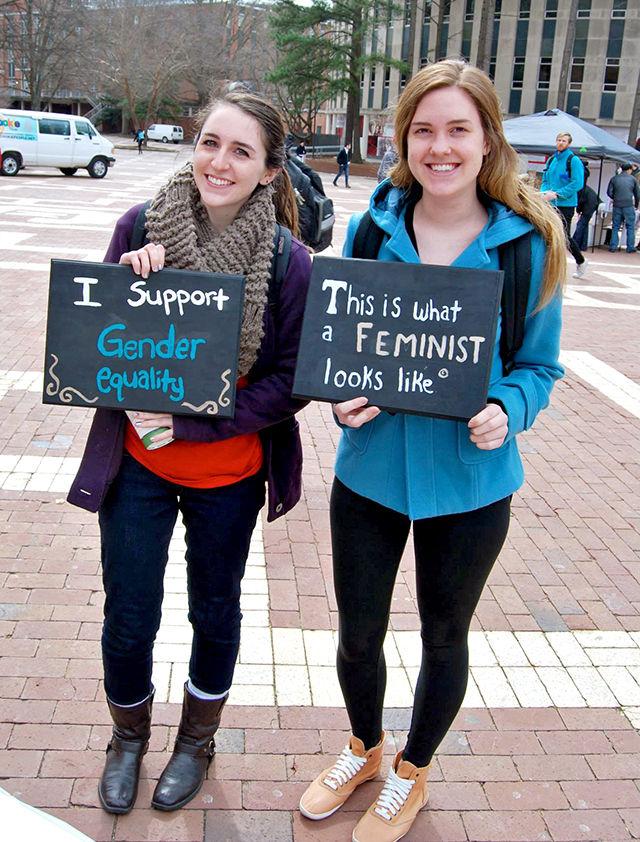Gender equality is a growing concern and has become a more popular topic on NC State’s campus with the implementation of the student-run organization Students Advocating for Gender Equality.
Diana Vasquez, senior in political science, co-founded SAGE with Callie Hagemeister, junior in social work, and Nicky Vaught, senior in psychology and women’s and gender studies, after realizing the lack of a student-run resource to discuss gender issues. By providing a student-operated group, Vasquez and the other members of SAGE can work with organizations such as the Women’s Center to educate the NC State community about gender equality.
“We basically want to be a place on campus where students who share a similar belief in the equality of genders can come to openly discuss topics related to gender or just to meet others,” Vasquez said.
According to Vasquez, during each meeting a member will speak on a topic he or she feels is important. As co-founder, Vasquez helps prepare the meetings, present issues and speak with advisors.
Vasquez said she would like to see SAGE become more active on campus and for the discussion of gender equality to become less taboo. This would lead to more concrete change on and off campus, according to Vasquez.
“We hope to do more active advocating this year, but I believe through education and open forums we are helping others learn about the issues that exist in our society today,” Vasquez said. “Many people are not aware of all the different issues that exist, and education is the first step in coming up with solutions.”
According to Vasquez, SAGE is a group for students to discuss specific changes they would like to see on and around campus. One goal of the group is to shut down the pregnancy crisis center near campus. According to Vasquez, the crisis center is essentially a clinic that mimics an abortion clinic but doesn’t offer pregnancy termination. Rather, it tries to convince women not to receive an abortion with misleading and false information.
Because SAGE is a relatively new student organization, its initial goals have included letting students know about the group and starting the conversation of gender equality on campus, a conversation that Vasquez said has been relatively silent until now.
According to Vasquez, SAGE focuses on a variety of topics, but she is particularly excited about pay parity for both genders. In addition, she also wants to look at the issue of women being able to “lean in” as Sheryl Sandberg, chief operating officer of Facebook and author of Lean In, would say.
“Women, consciously or subconsciously tend to pass up opportunities in their careers because of ideas that are ingrained into our psyche from a young age from society,” Vasquez said. “Examples include the idea that women should be more concerned about having a family rather than their careers, or that women should be more polite and not take as daring actions in their jobs.”
In regard to the issue of women passing up opportunities, Vasquez said that the solution should come from both males and females working together to create solutions by making conscious decisions to treat each other fairly.
Vasquez said a common misconception is that people who advocate for gender equality are some kind of extremists, and this view can hurt the progress of gender equality. Some people view feminists as “men-haters.” Vasquez said one of her personal goals for SAGE is to show students what feminism actually is and that they, as a group, are advocating for the fair treatment of all people.
Vasquez said she has heard various students claim not to be feminists, yet they agreed with a feminist idea. This misunderstanding of feminism is harmful, and students shouldn’t be afraid to identify as feminists, according to Vasquez. Another misconception Vasquez has seen is that SAGE is a group only for females, which isn’t true. According to Vasquez, SAGE has male members who bring great points to its discussions.
Otis McGresham, an assistant director at the NC State Women’s Center, serves as SAGE’s advisor. McGresham said he connected the founders after they each came to the Women’s Center with the idea of a student group focused on gender equality to discuss the possibility of creating such a club.
“SAGE provides an amazing opportunity for students to engage with gender equity and social justice issues in real time,” McGresham said. “Beyond theory or global impacts, SAGE allows students to work with their peers to address these issues in ways that are most salient to them and most impactful. I would like to see the relationship between the Women’s Center and SAGE continue to be reciprocal. I will continue to highlight opportunities to engage with SAGE through our regular communications to volunteers connected to the Center while SAGE supports the events and programmatic endeavors of the Women’s Center.”








